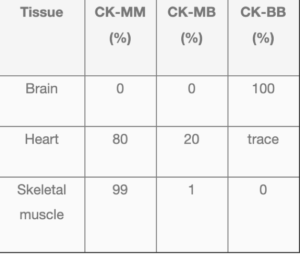Session 1
What are Troponin and CK MB and significance
Creatine kinase is composed of two subunits, CK-M (muscle type) and CK-B (brain type), which are combined into three distinct isoenzymes: CK-MM, CK-MB, and CK-BB. The following table illustrates the isoenzyme composition of different tissues.

CK-MB is a form of an enzyme found primarily in heart muscles. Any process that disrupts cardiac sarcolemma membranes (e.g., myocarditis, cardiac trauma, or cardiac surgery including endomyocardial biopsy) can release cytosolic CK–MB. Therefore, it has high specificity for cardiac tissue and was the preferred marker of cardiac injury for many years but it is not specific to MI. CK-MB typically begins to rise four to six hours after the onset of infarction but is not elevated in all patients until about 12 hours. An elevated CK-MB is specific for myocardial injury especially in patients with ischemic symptoms, when skeletal muscle damage is not present. Elevation in CK-MB return to baseline within 36-48 hours, in contrast to elevations in troponin which can last for as long as 10 to 14 days. Therefore, CK-MB cannot be used for late diagnosis of an acute MI like troponins. Comparison with cardiac troponin suggested that troponin provides better estimates of prognosis.
http://www.clinlabnavigator.com/creatine-kinase-mb-ck-mb.html
Troponin are a group of proteins found in skeletal and cardiac muscle fibers that regulate muscular contraction. There are 3 types of troponin proteins: troponin C, troponin, T and troponin I. Cardiac troponin I and T are specific and sensitive biomarkers of cardiac injury. Studies have shown that troponin I is a better cardiac biomarker compared to CK-MB and troponin T since its more sensitive and specific. Troponin is the preferred serologic test in the diagnostic evaluation of patients suspected of acute MI, and an elevated value is required in most cases. Normally, troponin is present in very small to undetectable quantities in the blood. When there is damage to heart muscle cells, troponin is released into the blood. The more damage there is, the greater the concentration in the blood. When a person has a heart attack, levels of cardiac-specific troponins I and T can become elevated in the blood within 3 or 4 hours after injury and may remain elevated for 10 to 14 day. Serial troponins are done when an MI is suspected since it takes a few hours for it to become elevated. Troponin levels may also be elevated with other heart conditions such as myocarditis, cardiomyopathy, CHF and with conditions unrelated to the heart such as severe infections and kidney diseases.
https://pubmed.ncbi.nlm.nih.gov/10395418/
https://labtestsonline.org/tests/troponin
https://www.uptodate.com/contents/troponin-testing-clinical-use?search=troponin&source=search_result&selectedTitle=1~150&usage_type=default&display_rank=1#H677625560
Session 2
Plan
- Pulmonary embolism
- IVF- .9% NS
- Enoxaparin 1 mg/kg subcutaneously every 12 hours
- Monitor O2 saturation
- DVT
- Enoxaparin 1 mg/kg subcutaneously every 12 hours (same treatment for PE)
- COVID 19
- antibody testing,
- Administer Acetaminophen 325 mg
- Continue Azithromycin
- Elevated Pro-BNP
- TTE indicatesNormal left ventricular systolic function, estimated EF 60-65%. Normal right ventricle size and function.
- EKG no acute changes
- Normal troponin
- Elevated Bun and BUN/Creatine:
- Repeat labs after administration of IVF
- Hypertension: Continue atenolol 25 mg oral tablet: Hx, orally 2 times a day – enalapril 10 mg oral tablet: Hx, 1 tab(s) orally once a day
- Diverticulosis: Continue Colace 100 mg oral capsule: Rx, 1 cap(s) orally 2 times a day, As Needed
- Vertigo: Continue meclizine 25 mg oral tablet: Rx, 1 tab(s) orally 3 times a day x 5 day



